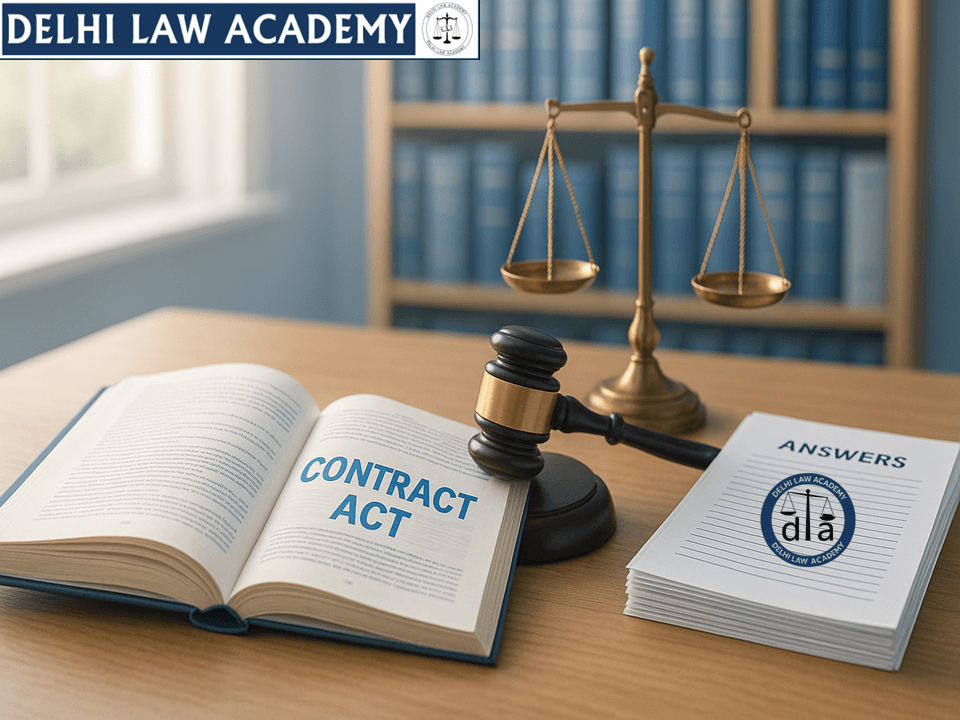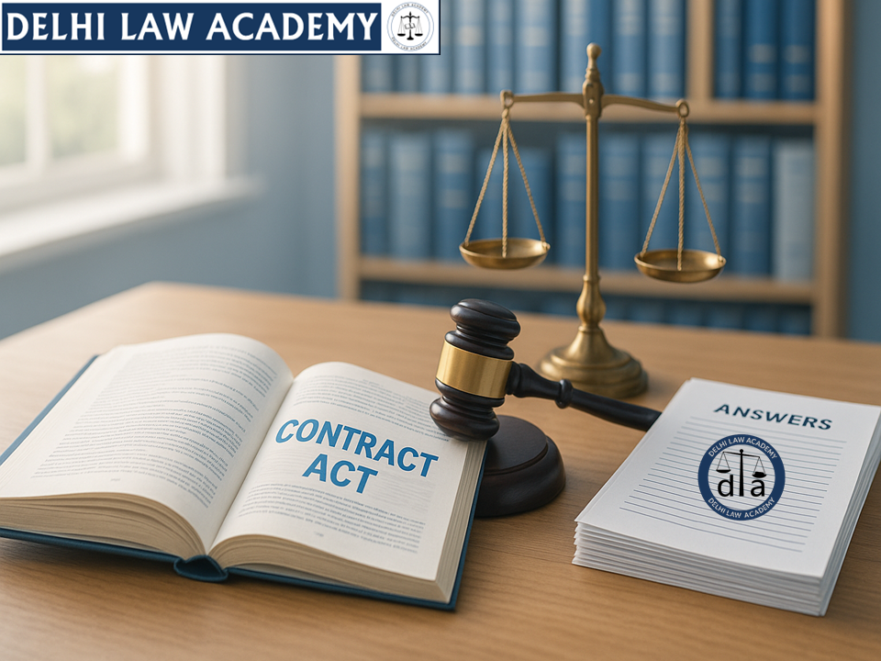
📜 The Indian Contract Act 1872
📝 BASICS OF A CONTRACT
The Contract Act forms the bedrock of any and every Judicial Service exam in the country. Its thorough knowledge is a must for all aspirants of RJS, DJS, PCS (J) and every other Judicial Service exam. To help such aspirants, Delhi Law Academy Jaipur has launched a series of study material modules on all important aspects of this vital part of their syllabus:
📬 Communication of proposals – Section 3
- Communication of a proposal is made by an act or omission of the proposer
- by which he intends to communicate such proposal or which has the effect of communicating it
✅ Acceptance of proposals
- Acceptance of proposal is made by any act or omission of the acceptor
- by which he intends to communicate such acceptance or which has the effect of communicating it
🔄 Revocation of proposals and acceptance
- Revocation of proposals and acceptance is made by any act or omission of the party revoking
- by which he intends to communicate such revocation or which has the effect of communicating it
📤 Communication when complete – Section 4
- Communication of a proposal is complete
- when it comes to the knowledge of the person to whom it is made
Illustration
A proposes, by letter to sell a house to B at a certain price.
Communication of proposal is complete when B receives the letter.
✅ Acceptance when complete?
Communication of an acceptance is complete
- as against the proposer:
- when it is put in a course of transmission to him so as to be out of the power of acceptor
- as against the acceptor:
- when it comes to the knowledge of proposer
Illustration
B accepts A’s proposal
- by a letter sent by post
Communication of acceptance is complete
- as against A
- when the letter is posted
- as against B
- when the letter is received by A
❓ Questions:
- At what stage do we say that a contract has been completed?
- How do we determine the place at which the contract is completed?
- Which court has jurisdiction in case of a breach of contract?
⚖️ Case study 3 – Bhagwandas Goverdhandas Kedia v. Girdharilal Parshottamdas 1966 SC
In this case, a party at Ahmedabad made a proposal to buy cotton seed cakes to the other party at Khamgaon in Maharashtra. The proposal was made on telephone. It was accepted on telephone. A contract was thus formed between the two parties.
Genesis of the case
Girdharilal Parshottamdas, the proposer, the party at Ahmedabad commenced an action at Ahmedabad against the acceptor, the other party, Kedia Ginning Factory of Khamgaon- “the defendants” for a decree for Rs. 31,150 on the plea that the defendants had failed to supply cotton seed cake which they had agreed to supply under an oral contract negotiated between the parties by conversation on long distance telephone.
General Rule
Acceptance and intimation of acceptance are both necessary to result in a binding contract.
When an offer is orally made, acceptance may be expected to be made by an oral reply, but even a nod or other act which intimates acceptance may suffice.
If the offeror receives no such intimation, even if the offeree has resolved to accept the offer, a contract may not result.
Exception
But on this rule is engrafted an exception:
- based on grounds of convenience
- which has the merit not of logic or principle
- but of long acceptance by judicial decisions
⚖️ Case Study 4 – Adams v. Lindsell 1818 King’s Bench
📌 Facts in Adams case
The defendants wrote a letter to the plaintiff offering to sell a quantity of wool and requiring an answer by post. The plaintiff accepted the offer and posted a letter of acceptance, which was delivered to the defendants nearly a week after they had made their offer.
The defendants, however, sold the goods to a third party, after the letter of acceptance was posted but before it was received by the defendants.
✅ Decision
The contract was complete as soon as the letter of acceptance was put into transmission.
💡 Reasoning
If the defendants were not bound by their offer when accepted by the plaintiffs till the answer was received, then the plaintiffs ought not to be bound till after they had received the notification that the defendants had received their answer and assented to it. And so it might go on ad infinitum.
🏛️ Approval by House of Lords
The rule in Adams case was approved by the House of Lords in Dunlop v. Vincent Higgins [1848].
This exception to the general rule [requiring intimation of acceptance] may be summarized as follows:
- When, by agreement or usage of trade, acceptance by post or telegram is authorised the bargain is struck and the contract is complete when the acceptance is put into a course of transmission by the offeree by posting a letter or dispatching a telegram
📞 When contract is made through telephone
Entores Ltd v. Miles Far East Corporation 1955 QB
Queen’s Bench decision..
“When a contract is made by post, the acceptance is complete as soon as the letter is put into the post box, and that is the place where the contract is made.”
“…the rule about instantaneous communications between the parties is different from the rule about the post.
The contract is only complete when the acceptance is received by the offeror… The contract is made at the place where the acceptance is received.”
⚖️ Decision of Supreme Court in Bhagwandas case
In case of conversation by telephone: Parties being in a sense in the presence of each other, Communication of acceptance is a necessary part of the formation of contract, the exception to the rule imposed on grounds of commercial expediency is inapplicable.
🔄 Revocation when complete? – Section 4
Communication of a revocation is complete
- as against the person who makes it:
- when it is put into a course of transmission to the person to whom it is made so as to be out of power of the person who makes it
- as against the person to whom it is made:
- when it comes to his knowledge
Illustration
A revokes his proposal by telegram:
- Revocation is complete
- as against A: when the telegram is despatched
- as against B: when B receives it
B revokes his acceptance by telegram:
- B’s revocation is complete
- as against B: when the telegram is despatched
- as against A: when it reaches him
⏳ Time of revocation of Proposals – Section 5
A proposal may be revoked any time before communication of its acceptance is complete against proposer but not afterwards.
Illustration
A proposes, by a letter sent by post to sell his house to B. B accepts the proposal by a letter sent by post.
A may revoke his proposal at any time before or at the moment when B posts his letter of acceptance but not afterwards.
⏳ Time of revocation of acceptance
An acceptance may be revoked any time before communication of acceptance is complete against acceptor but not afterwards.
Illustration
B may revoke his acceptance at any time before or at the moment when the letter reaches A, but not afterwards.
✏️ Revocation how made – Section 6
A proposal is revoked:
- by communication of revocation by proposer to the other party..
- by lapse of time prescribed in the proposal for acceptance
- If no time is prescribed: by lapse of a reasonable time without communication of acceptance
- by failure of acceptor to fulfil a condition precedent to acceptance
- by death or insanity of proposer
- if the fact of death or insanity comes to knowledge of acceptor before acceptance
📚 Continue Your Contract Act Preparation
Don’t stop here! Strengthen your knowledge of the Contract Act with our other fully solved tests:
📘 Free Study Material for Judiciary Aspirants!
Download our FREE study material prepared by Delhi Law Academy’s expert faculty.
❓ Frequently Asked Questions
Contact us
📍 Delhi Law Academy – Jaipur Branch
6C, Tower 2, Coaching Hub, Pratap Nagar, Jaipur – 302033
📞 Phone:
+91 9911916552
+91 8447285606
✉️ Email:
contactus@delhilawacademy.com

